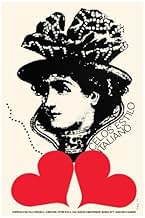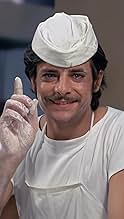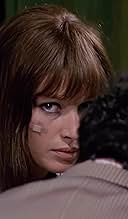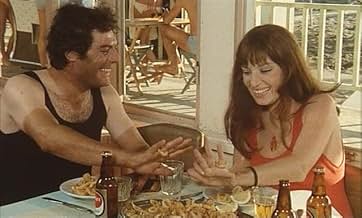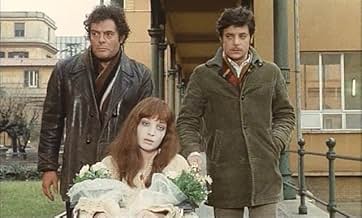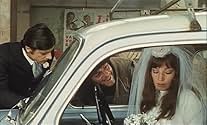Eifersucht auf Italienisch
Originaltitel: Dramma della gelosia (tutti i particolari in cronaca)
IMDb-BEWERTUNG
7,1/10
2625
IHRE BEWERTUNG
Eine dreifache Liebesbeziehung im Rom der frühen siebziger Jahre.Eine dreifache Liebesbeziehung im Rom der frühen siebziger Jahre.Eine dreifache Liebesbeziehung im Rom der frühen siebziger Jahre.
- Auszeichnungen
- 3 Gewinne & 5 Nominierungen insgesamt
Manuel Zarzo
- Ugo
- (as Manolo Zarzo)
Hércules Cortés
- Ambleto di Meo
- (as Hercules Cortes)
Fernando Sánchez Polack
- District Head of Communist Party
- (as Fernando Sanchez Polak)
Angelo Casadei
- Street Spectator
- (Nicht genannt)
Nestore Cavaricci
- Waiting man in hospital
- (Nicht genannt)
Empfohlene Bewertungen
I saw this move in the early 1970's on the channel 13 Albuquerque, NM TV station afternoon movie under the title "A tale of love and jealousy" and dubbed in English. In those days and on through my 20's I kept a notebook and rated movies. This one was number one then and still is to this day for me. In effect this movie has a tragic ending and is, in reality, a tragedy, but you do not realize it until the end. For the second showing I arranged a group of my friends to come watch and we all laughed throughout the entire movie until the end, in which a lot of things come together and you realize the underlying sadness. In particular, I remember the close-ups of Marcello Mastrioninni addressing the audience (the viewer) explaining his actions throughout the movie - an excellent effect, the reason for which becomes clear at the end of the movie.
I have suggested it to our local theater a number of times, but it may no longer be available in English. Too bad.
I have suggested it to our local theater a number of times, but it may no longer be available in English. Too bad.
Awesome movie.
I had never before watched an italian comedy but this one impressed me very much. The way that Ettore Scola deals with the tragic themes of the film is absolutely remarkable. By a use of the brechtian detachment he at first makes you laugh at horrible things such as suicide and conjugal violence while at the same time reminding you that what you are seeing is a film by constantly breaking the fourth wall and then at the end of the movie he makes the audience feel absolutely uncomfortable and guilty for indulging themselves in the humor of the film as he points out that these are not laughing matters and actual things that happen.
I also love the not monogamous undertone this one has and i can't help but thinking that the director implies that monogamy is outdated and one of the sources of violence against women. One thing that in a way validates this argument is the fact that Ettore Scola casts Monica Vitti in this, the same Monica Vitti famous for L'avventura and La notte, both films that deal with some of the same issues and always with the thought that maybe we would be better off if we renewed our morals (that by the way was sort of a obsession of Antonioni at the time, just watch his interviews).
Anyway it's a film and you can interpret it in whichever way you like to, i'm just here to say that it is a great, funny, beautifully shot, amazingly acted ( i absolutely love Monica Vitti in this), and amazingly scored and for those reasons, even if the politics in this don't interest you, you should see it regardless.
The fact that Paul Frees seems to do all the men's voices except for Marcello Mastroianni's and Giancarlo Giannini's seems to add a certain sameness to all the other men in the dubbed version of this film. Mastroianni is a communist bricklayer in love with Monica Vitti and she with him. He's best friends with Giannini, a Communist pizza maker, who's in love with Monica Vitti and she with him. It's like a dirty joke about them commies, they share everything. Except being human, they can't. It drives everyone crazy and the movie is very funny.
There seems to be enormous amounts of real subtextual commentary lost in translation. Mastroianni has his middle left finger in a sling throughout the movie, and is occasionally found on trash heaps. Given that his character's name is "Oreste" I think there's a reference to the classical legend, but it's not the Homeric, Pindaric, Sophoclean versions, but the bogus Robert Graves Year-King, fighting over Monica Vitti. Mastroianni does have flies buzzing around him a lot, indicating he's the Old King.
Given three screenwriters, including Age and Scarpelli, and Ettore Scola directing (he had given Vitti her first screen role almost two decades earlier), there is obviously a lot in this movie that is both precisely of its time and of its place, ill suited to the sort of random translation that an Italian sex comedy got in the 1970s. Unless someone is willing to go back and do a more careful translation, there's little more than a funny and bizarre comedy here. However it certainly is that.
There seems to be enormous amounts of real subtextual commentary lost in translation. Mastroianni has his middle left finger in a sling throughout the movie, and is occasionally found on trash heaps. Given that his character's name is "Oreste" I think there's a reference to the classical legend, but it's not the Homeric, Pindaric, Sophoclean versions, but the bogus Robert Graves Year-King, fighting over Monica Vitti. Mastroianni does have flies buzzing around him a lot, indicating he's the Old King.
Given three screenwriters, including Age and Scarpelli, and Ettore Scola directing (he had given Vitti her first screen role almost two decades earlier), there is obviously a lot in this movie that is both precisely of its time and of its place, ill suited to the sort of random translation that an Italian sex comedy got in the 1970s. Unless someone is willing to go back and do a more careful translation, there's little more than a funny and bizarre comedy here. However it certainly is that.
This is the passionate, tragic, acid, perversely funny story of a love triangle -- at one point, almost a ménage-à-trois -- involving bricklayer Oreste (Mastroianni in one of his very best performances, a sort of grotesque version of his character in "I Compagni"), flower-seller Adelaide (isn't it time we acknowledged Monica Vitti as THE most accomplished Italian comedienne ever? And being that gorgeous didn't hurt either) and pizzaiolo Nello (Giancarlo Giannini in a star-making role). With this film, Ettore Scola proved to be the great new voice in commedia all'italiana, a deserving heir to the maestri of this great tradition (DeSica, early Fellini, Germi, Monicelli, Risi) but adding steamier sarcasm and corrosiveness in his pitiless criticism of Italian society and its conservative mores.
We, as the audience, play a very important part here: it's to us (the invisible judge of a trial) that Oreste, Adelaide and Nello present their cases in the flashbacks that shows us the different angles of their convoluted story of friendship, love, betrayal and attempted murders/ suicides, in a sort of comedic Rashomon. The expertise of Scola's writing and the charisma of the starring trio make us care a lot for those hopeless losers, so unmistakably human.
Scola achieves a very rare thing: he uses caricature, comedic clichés and grotesqueness and raises them to refined art, craftily mixing tragedy and comedy with political overtones and social satire. This is on the same level as (and is a sort of cross between) Scola's masterpieces "C'Eravamo Tanto Amati" and "Brutti Sporchi Cattivi". You can do no wrong here: this is a delight that keeps your brain working AND your laughing muscles contracting, an achievement that sounds almost paradoxical by today's moronic, puerile standards of film comedy.
We, as the audience, play a very important part here: it's to us (the invisible judge of a trial) that Oreste, Adelaide and Nello present their cases in the flashbacks that shows us the different angles of their convoluted story of friendship, love, betrayal and attempted murders/ suicides, in a sort of comedic Rashomon. The expertise of Scola's writing and the charisma of the starring trio make us care a lot for those hopeless losers, so unmistakably human.
Scola achieves a very rare thing: he uses caricature, comedic clichés and grotesqueness and raises them to refined art, craftily mixing tragedy and comedy with political overtones and social satire. This is on the same level as (and is a sort of cross between) Scola's masterpieces "C'Eravamo Tanto Amati" and "Brutti Sporchi Cattivi". You can do no wrong here: this is a delight that keeps your brain working AND your laughing muscles contracting, an achievement that sounds almost paradoxical by today's moronic, puerile standards of film comedy.
A brilliant film; all three leads are just magnifico and Monica Vitti never looked better. Vitti, Mastroianni and Giannini in one film! Sharp treatment of un amour fou. Had never heard of the film before I recently saw it at a festival of restored films at MoMA in New York--what a terrific surprise, a genuine treat, funny and dark film about obsession. I doubt it could ever have been made in the US unfortunately; can't think of any American directors who could handle this successfully. Mastroianni shows his great range. If you love Italian film, see it soon! Now I'm going to see any other Ettore Scola films I can find or haven't seen yet.
Wusstest du schon
- WissenswertesThis was the first of eight starring feature film roles Marcello Mastroianni would appear in for Ettore Scola. These films included Ein besonderer Tag (1977), Die Terrasse (1980), Flucht nach Varennes (1982), Permette? Rocco Papaleo (1971), Splendor (1989), Wie spät ist es? (1989), and Macaroni (1985).
- Zitate
Oreste: How would you like a pizza? Huh?
Adelaide: You mean pizza?
Oreste: Yes! Pizza.
Adelaide: But, I'm not in the mood for pizza.
Oreste: Oh, but your favorite meal is pizza. Come on!
Adelaide: But, I don't feel like eating pizza today.
Oreste: You can't talk me out of it. We're definitely eating pizza.
- VerbindungenEdited into Dolce Vitti (2014)
Top-Auswahl
Melde dich zum Bewerten an und greife auf die Watchlist für personalisierte Empfehlungen zu.
- How long is The Pizza Triangle?Powered by Alexa
Details
- Erscheinungsdatum
- Herkunftsländer
- Sprache
- Auch bekannt als
- Jealousy, Italian Style
- Drehorte
- Produktionsfirmen
- Weitere beteiligte Unternehmen bei IMDbPro anzeigen
- Laufzeit
- 1 Std. 47 Min.(107 min)
- Sound-Mix
- Seitenverhältnis
- 1.85 : 1
Zu dieser Seite beitragen
Bearbeitung vorschlagen oder fehlenden Inhalt hinzufügen

